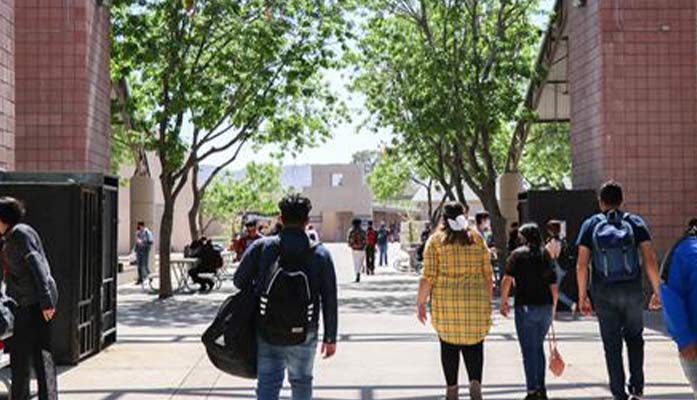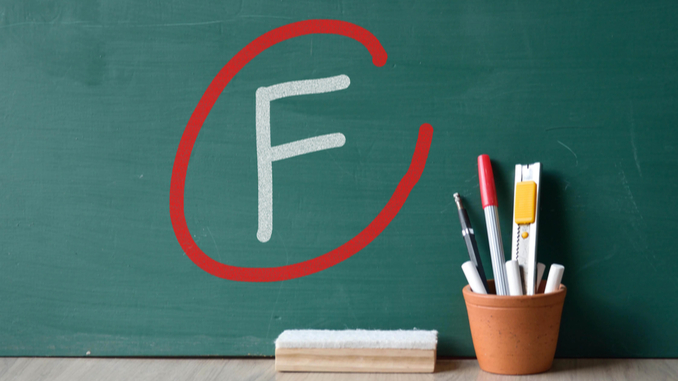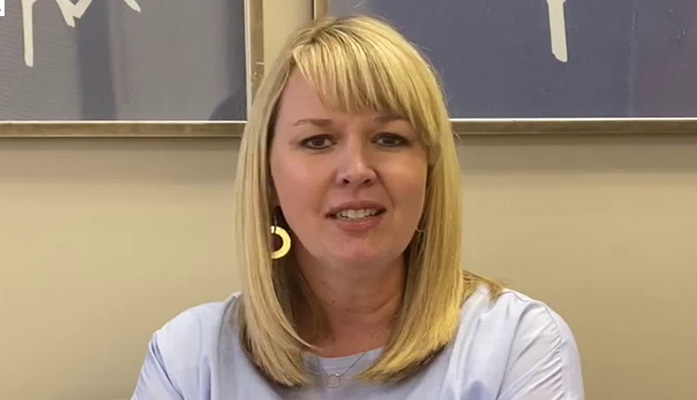
by Matthew Holloway | Oct 30, 2025 | Education, Must Read, News
By Matthew Holloway |
The Phoenix Union High School District (PXU) is preparing for significant budget reductions and potential staff layoffs as enrollment continues to drop, according to a letter sent to district employees on October 24th by Superintendent Thea Andrade.
In a letter to PXU colleagues posted to X by Phoenix Union Governing Board Member Jeremiah Cota, Andrade cites a decline of approximately 1,800 students in the 2025-2026 school year, following a drop of about 1,200 students the previous year. This represents a total loss of roughly 3,000 students, or about 10% of the district’s overall population, since its high point in 2022.
The superintendent attributes the budget cuts to “a significant decline in student enrollment.” In her letter, she explains that “the reasons for declining enrollment are complex,” and pivots to what she says are contributing factors: “the largest expansion of Empowerment Scholarship Accounts (ESA) in our state’s history,” the continued growth of charter schools, local demographic challenges such as gentrification and low birth rates, and the expiration of several federal Elementary and Secondary School Emergency Relief (ESSER) funds.
The announcement drew immediate response from Governing Board Member Jeremiah Cota, who slammed the district for casting blame on ESA families, charter schools, and Arizona’s Republican-led legislature.
In his post, Cota said that as a board member, he has repeatedly requested improvements in school safety and has been “all but ignored.” He also expressed concern that parents are hesitant to send children to district schools due to safety issues and “woke identity politics” in classrooms.
Cota wrote in full:
“Today, Phoenix Union High School District announced an untold number of possible job cuts due to declining enrollment.
It’s unfortunate, this district has chosen to blame ESA families, charter schools, and the GOP legislature for their budget shortfalls.
As a board member for @PhoenixUnion, from day one I’ve asked to make our schools safer and have all but been ignored on EVERY single request.
Parents, don’t feel safe sending their kids to one of our schools and are tired of the woke identity politics being injected in the classroom.
Yet, here we are, big enrollment drops and possibly even bigger job cuts coming.
TRUTHFULLY, I am concerned the present board will not take any corrective action to stem this decline.”
To address the financial strain, the district has already implemented cuts. In the 2023-2024 school year, it reduced district office budgets by $8.6 million and reorganized the executive team, eliminating several administrative positions to shield campus roles. For the 2024-2025 school year, per AZ Family, an additional $5.8 million was cut through district office reductions, unfilled vacancies, and natural attrition.
As previously reported by AZ Free News, the Phoenix Union High School District (PXU) faced major controversy going into a vote to approve a Memorandum of Understanding (MOU) with Chicanos Por La Causa (CPLC) to provide substance abuse prevention and mental health services at three high schools. The MOU outlines CPLC’s role as a subgrantee of the Arizona Health Care Cost Containment System (AHCCCS) under the federal Substance Abuse Prevention and Treatment Block Grant (SABG).
The MOU would also permit CPLC to offer “Health Masculinity Services for Self-Identified Males.”
Looking ahead, the district projects it will need to cut another $15 million in the 2025-2026 school year and $20 million in the 2026-2027 school year to maintain solvency. Approximately 90% of the district’s annual budget goes toward employee salaries and benefits, Andrade noted.
Matthew Holloway is a senior reporter for AZ Free News. Follow him on X for his latest stories, or email tips to Matthew@azfreenews.com.

by Jonathan Eberle | Oct 30, 2025 | News
By Jonathan Eberle |
Arizona State Senator David Farnsworth (R-LD10), chairman of both the Senate Appropriations and Transportation committees, is pushing to bring private-sector innovation to Arizona’s public transportation system.
In a recent meeting with Uber policy officials, Farnsworth called for new partnerships that harness technology and market-based solutions to make transit in the East Valley more efficient, cost-effective, and responsive to residents’ needs.
The meeting focused on exploring how companies like Uber could play a larger role in shaping Arizona’s transportation future — particularly through autonomous vehicle technology. Farnsworth highlighted the success of similar programs by Waymo and urged Uber to consider developing comparable systems that could supplement or even replace traditional fixed-route bus services.
“We have a responsibility to find effective solutions for the people of Arizona, rather than simply maintaining inefficient systems that waste taxpayer funds,” Farnsworth said. “Meeting with companies like Uber highlights a significant opportunity to let innovation take the lead.”
Farnsworth emphasized that current bus routes often operate with minimal ridership, resulting in high operational costs with limited public benefit. By contrast, autonomous ride-share models could provide flexible, on-demand transit available around the clock — reducing taxpayer burden while improving reliability and safety.
The senator framed his proposal as part of a broader effort to prioritize fiscal responsibility and smart governance. “Autonomous vehicles can provide safer and more efficient transportation, and I will keep working to ensure that Arizona remains at the forefront of realistic and sustainable travel options for the future,” he added.
Farnsworth’s initiative reflects a growing movement among Arizona lawmakers to integrate private-sector innovation into state infrastructure systems. As the East Valley continues to grow, policymakers are looking toward new ways to connect residents to jobs, schools, and local businesses — without expanding costly and underused public transit routes.
If discussions progress, Farnsworth’s collaboration with Uber could mark a turning point for Arizona’s approach to public transportation, signaling a shift toward efficiency, adaptability, and technology-driven mobility.
Jonathan Eberle is a reporter for AZ Free News. You can send him news tips using this link.

by Tiffany Benson | Oct 29, 2025 | Opinion
By Tiffany Benson |
The report on Average ACT Test Scores By State Graduating Class of 2025 shows that Arizona public schools are still failing our students. A Legal Process highlighted the results, stating:
“From the data on the class of 2025, college admissions officers and future employers can reasonably conclude that if the applicant is a graduate of Arizona schools, more likely than not, they cannot proficiently read, write, perform math, or understand science in comparison to their peers.”
A Legal Process also noted that a majority of Arizona’s 2025 graduates failed to meet one core academic benchmark. “55% of Arizona’s students can graduate high school and still not demonstrate college-ready level competency in a single core academic subject matter,” the publication said.
World Population Review published Public School Rankings by State 2025, which shows Arizona dead last overall in four categories: K-12 performance, school funding and resources, higher education quality, and safety. This is corroborated by Consumer Affairs, which rated Arizona number one on its list entitled, “Which states rank poorly for education?”
Arizona wastes between $10,000 and $14,000 per student, depending on the source. Meanwhile, the average ESA is estimated between $6,000 and $9,000 for students in 1st through 12th grade. Current trends also reveal that K-12 families are ditching government education at an impressive rate. Even if these calculations are off by 10 decimal points, my conclusion remains the same: The A-F School Letter Grade classification system is a complete joke, and school choice is the one good thing happening in Arizona education.
On September 21, 2025, the Goldwater Institute published a report titled, “The Hidden Ways Arizona School Superintendents Are Paid.” In the opening paragraph, it states:
“Arizona school district superintendents receive high salaries. Yet, the true scale of that pay is often obscured by a triangle of complex contract provisions that school boards, and the superintendents themselves, deliberately design to mask the full measure of compensation from taxpayers…
These same school districts go to great lengths to block access to superintendent contracts—in some cases even from their own board members—shielding from the public how tax dollars enrich those who often are their community’s highest-paid public employees.”
Goldwater requested more than 40 superintendent contracts—official records that should be accessible to the general public—only to receive the documents after four months of repeated requests and warnings of potential litigation. The following information is also sourced from their report:
- Not including health insurance or pension costs, Arizona superintendents’ base salaries average $215,000 a year, while taxpayers are charged up to $490,000 per superintendent after accounting for “lucrative perks.”
- In addition to pension benefits, several school districts are double-charging taxpayers for superintendents’ retirement packages.
- Taxpayers are funding superintendents’ personal and vacation leave to the tune of 15 weeks off, when combined with school holidays. When vacation days are unused, superintendents receive a payout in the form of additional compensation.
Goldwater rightly called attention to Tolleson Union High School District Superintendent Jeremy Calles, who makes off with roughly $500,000 a year. Although Tolleson ranks as the 16th largest district in the state, Calles earns at least $100,000 more than any other Arizona Superintendent. Not surprisingly, he was accused of financial misconduct and, according to ABC 15, the auditor general’s investigation into Calles is expected to be completed by January 2027.
Notably, Calles also stands accused of inflating enrollment numbers, loaning $25 million to the Isaac School District, and allowing one teacher to resign with full benefits after complaints that the former employee had an inappropriate relationship with a student. Regardless, Calles appears to have an explanation for everything. And, despite the embarrassing controversy, he still finds half a million reasons to show up for work.
In his October 2025 superintendent message, Calles declared:
“There are so many good things happening [in] our district right now that it is difficult to put them all into one newsletter…Our letter grades continue to rise…Success is not without consequence. If we are going to be the best district in the state, then we cannot get there by trying to do what everyone else is doing; we have to innovate.”
He signed off by stating that how Tolleson residents respond to a bond and override this November will “reveal how the community feels about the direction of the district.” I know how I would vote if I lived in Tolleson—it’s the same way I’m voting in Peoria.
If you’re anything like me, you’re a fish out of water when it comes to district finance. Simple is the only way I know how to be. Thus, maintenance and overrides (M&O) allow school districts to exceed their budget for salaries and daily operations by 15% in most cases. M&Os are marketed to the public as a means to “enhance student safety and special education programs.” Districts sell educators on increased pay, so (radical) teachers’ unions generally support overrides as well.
Tax increases are presented to homeowners in fractions and decimals and crumbs, rather than the sum total. Consequently, landowners must research their property value before they can know the full size of their “fraction.” Note that since overrides have literally been in place for decades, district representatives automatically expect taxpayers to honor the tradition of compliance as they’ve done in previous elections.
In August 2025, AZ Free News reported:
“Despite a 5% drop in district school enrollment since 2019, Arizona’s public-school districts have continued to expand facilities, increase capital spending by 67% to $8.9 billion, and boost transportation costs by 11.3% to $561.2 million, even as eligible bus riders plummeted by 45%…The fastest-shrinking districts have increased capital spending the most, with 20% of districts (serving 73% of students) receiving 81% of capital funding.”
Let’s be real. Taxpayers are not investing in gifted programs or sponsoring all-day kindergarten. This, my fellow proletariats, is what you call a bailout.
Rather than telling Arizonans how to vote in this election, I will instead refer you back to the information covered in this post. I encourage parents, property owners, and slighted educators to use sound judgment at the ballot box. Remember, the most basic definition of insanity is doing the same thing over and over again, expecting a different result.
Again, I’m no mathematician. But I’m willing to believe that at least a significant portion of the funds required to increase teacher salaries, enhance special needs programs, and implement cutting-edge safety plans can be found in the bank accounts of every district’s highest-paid employee.
Tiffany Benson is the Founder of Restore Parental Rights in Education. Her commentaries on education, politics, and Christian faith can be viewed at Parentspayattention.com and Bigviewsmallwindow.com. Follow her on socials @realtiffanyb.

by Matthew Holloway | Oct 29, 2025 | News
By Matthew Holloway |
Recent filings show Mesa City Councilwoman Julie Spilsbury raising $94,207 for her November 4 recall defense, including several Democratic donors and aligned figures.
Spilsbury, a two-term council member, entered the reporting period with a remaining balance of $1,631 from January filings before piling on over $90k in donations. Her total raised now exceeds her 2023 re-election campaign by nearly $30,000. She has reportedly spent $32,866 during the period, including $28,700 on consultant services.
Among Spilsbury’s donors are Tim Stringham, a Tempe Navy veteran and unsuccessful Democratic candidate for Maricopa County Recorder; Jennifer Pawlik, former Chandler Democratic state representative; and other individuals with Democratic ties.
Stringham contributed an unspecified amount, Pawlik gave $100, and former Maricopa County Recorder Stephen Richer gave $1,000, as reported by The Mesa Tribune.
Spilsbury also received $1,500 from the John Giles for Mayor Committee. Giles served as Mesa mayor for a decade before leaving office in January 2024 and has vocally supported both former President Joe Biden and former Vice President Kamala Harris in their presidential campaigns.
In addition to the others named, Councilwoman Spilsbury’s donor list includes: Colleen Wheeler, a Mesa healthcare executive ($4,250); Yasser Sanchez, a Gilbert immigration attorney ($3,500); David Johnson, a Mesa real estate broker ($2,500); David Stahle, a Mesa financial consultant ($2,500); Mary “Marcie” Hutchinson, Mesa Public Schools Governing Board member ($1,000); Stan Barnes, Mesa Republican political consultant ($500); Sean Lake, Mesa land-use attorney ($500); Dennis Kavanaugh, former Mesa councilman ($100); Dr. Andi Fourlis, former Mesa Public Schools superintendent ($100); Lacy Chaffee, Mesa Public Schools Governing Board member ($100); and Richard Humpherys, husband of Gilbert Public Schools Governing Board member Jill Humpherys ($50).
The councilwoman also received $17,300 from political action committees, including $6,750 from United Mesa Firefighters, $6,750 from Moms Fed Up, and $2,500 from Country First.
Taylor, a political newcomer, reported expenditures of $5,717, including $4,072 to Mesa Sign Shop and $900 to Moir & Associates for consulting.
Taylor’s donors include: Earl Taylor, a Mesa retiree and founder of Heritage Academy charter school ($3,200); Scott Grainger, a Mesa forensic engineer ($2,000); David Winstanley, a Mesa retiree ($1,042); David Cummard, a Mesa insurance CEO ($1,000); Joseph Hughes, a Gilbert retiree ($1,000); and Melody Whetstone, who ran against Spilsbury in the 2023 primary ($105).
Taylor received $5,500 from PACs, including $5,000 from the Arizona Free Enterprise Club’s Freedom Club and $500 from the Home Builders Association of Central Arizona.
The recall petition, initiated by a resident with assistance from Turning Point USA, gathered 5,235 signatures, of which Maricopa County verified 3,858. The petition accuses Spilsbury of using her office to advance private interests, citing her votes in favor of a temporary homeless shelter in District 2, a council pay raise, and increases in residential and commercial utility rates. The shelter vote passed 4-3; the pay raise and utility rate increases passed unanimously 7-0.
Spilsbury’s support for an anti-discrimination ordinance extending protections to groups, including gender identity, has also been referenced in the recall effort. Taylor has connected Spilsbury’s shelter vote to homelessness issues in Mesa.
In December 2023, residents at a council meeting criticized Spilsbury and former Mayor John Giles for supporting Vice President Kamala Harris and other Democratic candidates in the presidential election. The Republican committees of Legislative Districts 9 and 10 passed resolutions censuring Spilsbury for campaigning on behalf of multiple Democrats.
In the July 2023 primary for District 2, Spilsbury received 8,120 votes, or 65.91%, out of 12,322 total votes cast. District 2 has 49,329 registered voters, according to the Mesa City Clerk.
Spilsbury and her supporters have canvassed neighborhoods every Saturday since early September. Taylor has conducted door-to-door outreach and met with voters in the district.
The city estimates the special election will cost at least $104,577. The winner will take office the day after the vote count. If Spilsbury retains her seat, she will serve through January 2029; if Taylor wins, she will complete the remainder of the term.
Matthew Holloway is a senior reporter for AZ Free News. Follow him on X for his latest stories, or email tips to Matthew@azfreenews.com.

by Staff Reporter | Oct 29, 2025 | Education, News
By Staff Reporter |
Northern Arizona University (NAU) is the latest in the state to drop its program with a Chinese university over national security concerns.
House committees on the Chinese Community Party and Education and the Workforce released a report last month flagging security concerns within NAU’s partnership with a Chinese municipal public university, Chongqing University of Post and Telecommunications (CQUPT).
The report outlined the main pathways by which China manipulates the American university system to benefit its military interests.
“What once came through Confucius Institutes now flows through new channels — less visible but no less strategic,” stated the report. “The Select Committee is now actively investigating these additional CCP activities — including the China Scholarship Counsel and student visa pathways — which, combined with joint institutes, illustrate a coordinated strategy by the CCP: leverage American institutions to train PRC talent, absorb U.S. research, and convert that knowledge into military and economic advantage. Joint institutes are just one vector — the problem is systemic.”
Rep. Eli Crane commended NAU for shutting down the program following the report’s publication.
“I applaud Northern Arizona University’s leadership in reviewing its international partnerships and ensuring that its programs align with national security initiatives,” said Crane in a press release on Monday. “NAU’s actions reflect a responsible approach to protecting students, faculty, and the integrity of U.S. research and education. We greatly appreciate their commitment to these shared values, as well as all they do for Northern Arizona.”
The CQUPT program was a 3+1 dual-degree program in Electrical Engineering.
Full withdrawal will occur within 90 days, per Crane’s press release.
NAU’s program was one of over 50 university partnerships the congressional committees deemed “high-risk” for their involvement with universities guided by Chinese Communist Party (CCP) military and defense interests. The congressional committees disclose that the list is not all-inclusive and that more may exist.
The University of Arizona (U of A) had two programs included in the congressional report that were deemed high risk: one with the Harbin Institute of Technology (HIT) and the other with the Arizona College of Technology (ACT) at Hebei University of Technology (HUT).
The HIT program is one of three joint programs that American universities launched with one of China’s Seven Sons of National Defense (SSND) universities.
Only universities selected by the Chinese Communist Party (CCP) to advance China’s military and defense research qualify as SSND.
Although the report declared the HIT partnership to be active, U of A has stated it terminated its partnership in December 2023.
The committees also determined the University of Arizona’s Arizona College of Technology at Hebei University of Technology.
Last month, U of A faculty were advised that Chinese microcampuses would be closed following congressional advice on national security concerns with the partnerships.
U of A issued a notice on its Research and Partnerships page last December that SSND posed “atypical security risks and concerns about misuse of research for military purposes” due to their being controlled by CCP’s Ministry of Industry and Information Technology.
AZ Free News is your #1 source for Arizona news and politics. You can send us news tips using this link.





